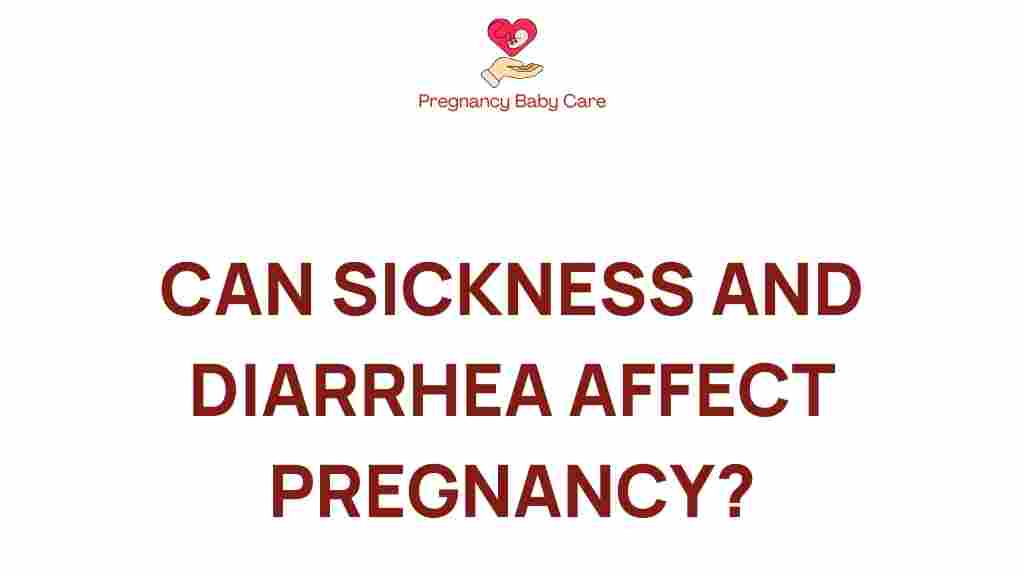How Can Sickness and Diarrhea Influence Your Pregnancy Journey?
Pregnancy is a miraculous journey, but it can be accompanied by various challenges that may affect your health and maternal well-being. Among these challenges, sickness and diarrhea are common issues that many expectant mothers face. Understanding how these conditions can influence your pregnancy is crucial for maintaining health and preventing complications. In this article, we’ll explore the impact of sickness and diarrhea during pregnancy, their causes, and effective management strategies to help you navigate this critical time.
Understanding Sickness and Diarrhea in Pregnancy
Sickness during pregnancy often refers to nausea and vomiting, commonly known as morning sickness. While it typically occurs in the first trimester, some women experience it throughout their entire pregnancy. Diarrhea, on the other hand, can result from various factors, including infections, dietary changes, or underlying health conditions. Both conditions can lead to dehydration and nutrient deficiencies, impacting your overall health and that of your baby.
The Impact of Sickness on Pregnancy
Morning sickness affects many pregnant women, and while it’s often seen as a normal part of pregnancy, it can still pose risks:
- Dehydration: Frequent vomiting can lead to dehydration, which is detrimental to both maternal and fetal health.
- Nutritional Deficiencies: Persistent nausea can make it difficult to maintain a balanced diet, risking essential nutrient intake.
- Weight Loss: Some women may experience significant weight loss, which can affect fetal growth and development.
The Impact of Diarrhea on Pregnancy
Diarrhea during pregnancy can be caused by dietary changes, stress, or infections. Its effects include:
- Dehydration: Like sickness, diarrhea can lead to severe dehydration, which can have serious implications for pregnancy.
- Electrolyte Imbalance: Losing fluids can result in an imbalance of electrolytes, critical for bodily functions.
- Complications: In severe cases, diarrhea can lead to complications such as preterm labor or low birth weight.
Common Causes of Sickness and Diarrhea During Pregnancy
Understanding the causes of sickness and diarrhea can help in managing them effectively. Here are some common factors:
- Hormonal Changes: Increased hormone levels can trigger nausea and vomiting.
- Dietary Changes: New cravings or aversions can lead to digestive upset.
- Stress and Anxiety: Emotional factors can exacerbate gastrointestinal symptoms.
- Infections: Viral or bacterial infections can cause diarrhea and vomiting.
- Food Intolerances: Pregnant women may develop sensitivities to certain foods.
Managing Sickness and Diarrhea During Pregnancy
Effective management of sickness and diarrhea is essential for maintaining maternal well-being during pregnancy. Here are some strategies to consider:
1. Nutrition and Diet
A well-balanced diet is crucial for combating sickness and diarrhea:
- Small, Frequent Meals: Eating smaller meals more frequently can help reduce nausea.
- Hydration: Stay hydrated by drinking plenty of water and electrolyte-rich fluids.
- BRAT Diet: For diarrhea, consider the BRAT diet (bananas, rice, applesauce, toast) to help firm stools.
- Avoid Triggers: Identify and avoid foods that worsen nausea or diarrhea.
2. Prenatal Care
Regular prenatal visits are essential for monitoring your health and the health of your baby:
- Inform Your Doctor: Always inform your healthcare provider about any episodes of sickness or diarrhea.
- Follow Recommendations: Adhere to any dietary or lifestyle recommendations provided by your healthcare team.
3. Home Remedies
Some natural remedies may provide relief:
- Ginger: Ginger tea or ginger candies can help alleviate nausea.
- Peppermint: Peppermint tea may soothe digestive discomfort.
- Rest: Ensure you get enough rest to help your body recover.
When to Seek Medical Attention
While mild sickness and diarrhea are often manageable at home, certain signs indicate the need for medical attention:
- Severe Dehydration: Signs include dark urine, dizziness, or extreme fatigue.
- Persistent Symptoms: If symptoms continue for more than 24 hours or worsen.
- Fever: A fever above 100.4°F (38°C) can indicate an infection.
- Severe Abdominal Pain: This could signal complications that require immediate care.
Complications Associated with Sickness and Diarrhea
Ignoring sickness and diarrhea during pregnancy can lead to serious complications:
- Gestational Dehydration: This can lead to reduced amniotic fluid and affect fetal development.
- Preterm Labor: Severe dehydration and electrolyte imbalances can trigger early contractions.
- Low Birth Weight: Nutritional deficiencies due to vomiting or diarrhea can hinder fetal growth.
Tips for Maintaining Maternal Well-Being
To enhance your overall health during pregnancy, consider the following tips:
- Stay Active: Engage in light exercise as approved by your healthcare provider.
- Manage Stress: Practice relaxation techniques like yoga and meditation.
- Educate Yourself: Read about pregnancy and childbirth to feel more prepared.
- Build a Support System: Surround yourself with supportive family and friends.
Conclusion
Understanding how sickness and diarrhea can influence your pregnancy journey is vital for ensuring maternal well-being. By recognizing the potential complications, managing symptoms through nutrition and prenatal care, and knowing when to seek medical advice, you can protect your health and that of your baby. Remember, maintaining good health during pregnancy is a partnership between you and your healthcare provider. For more information on prenatal care, consider visiting this resource. Always prioritize your well-being and communicate openly with your healthcare team.
Take charge of your pregnancy journey by staying informed and proactive about your health. Your body is doing extraordinary things, and by caring for it, you can create a healthy environment for your growing baby.
This article is in the category Pregnancy and created by PregnancyBabyCare Team
